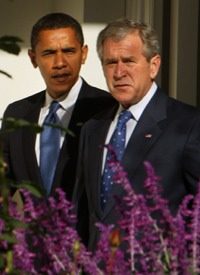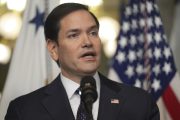
The Obama administration has announced that the annual federal deficit remained at a whopping $1.29 trillion during the fiscal year that ended October 1, just a fraction under 2009’s record of $1.43 trillion.
The deficit was more than $100 billion higher than Obama had predicted with his first budget proposal for 2010, but lower than more recent forecasts. The President’s fiscal 2010 budget proposal, issued early in 2009 and entitled A New Era of Responsibility, placed most of the blame for the deficit that existed in 2009 upon the Bush administration. It claimed (partly correctly) that the Bush administration “helped turn a surplus of $236 billion at the end of the Clinton Administration, that was projected to grow still larger over time, into a deficit of more than $1 trillion in 2009. Of course, Obama’s fiscal 2010 budget proposal had already been larded up with stimulus spending that spiked the deficit much higher than the nearly $1 trillion Bush-era deficit.
Even the Obama-friendly National Public Radio announced October 18 that the administration had reported the Mt. Everest of deficits. But NPR noted hopefully that there’s actually a fair amount of good news in Friday’s report the administration would like you to know about.
Ironically, much of that “good news” had little to do with the Obama administration’s own fiscal prudence or policies. The U.S. Treasury Department press release on the budget figures does claim credit for the slight decrease in deficit size from last year, but reading between the lines reveals that the decrease is simply the result of a Bush-era policy costing less than anticipated. Due to careful stewardship of the emergency programs, their effect on the deficit was much smaller than previously estimated. The Troubled Asset Relief Program (TARP) had outlays of just $9.0 billion in FY 2010, which was $25.9 billion or 74 percent below previous estimates from July 2010, the October 15 Treasury press release claimed.
Paul Krugman, ultra-leftist columnist for the New York Times (pardon the redundancy), has been arguing for some time that Obama needs to go big on deficits and has even made the case that the President didn’t really change the course set by the Bush administration:
The whole story is a myth. There never was a big expansion of government spending. In fact, that has been the key problem with economic policy in the Obama years: we never had the kind of fiscal expansion that might have created the millions of jobs we need…. If job-creating government spending has failed to bring down unemployment in the Obama era, its not because it doesnt work; its because it wasn’t tried.
How can Keynesian economist Krugman make such an obviously false statement? It is false, of course. Federal spending has increased at about 10 percent per year under Obama.
But Krugman makes his claim by pointing out that while President Obama has dramatically increased federal spending, he didn’t increase it at a faster rate than the equally fiscally irresponsible Bush administration.The Bush-era budgets increased at a nearly 10 percent rate as well. Federal spending has more than doubled in the 10 years since George W. Bush first took office, which amounts to a heck of a lot of Keynesian-style economic stimulus. Deficits have increased much more quickly under Obama because the economy crashed and revenues remained flat, Krugman has noted, while during most of the Bush era the IRS was able to extract more and more dollars from American taxpayers.
By pointing out that both Bush and Obama have dramatically increased federal spending, Krugman has essentially made the case that both Presidents have engaged in Keynesian economic stimulus for the past 10 years. The current economic situation is the direct result of Keynesian economics. In one respect, it is a lot like the last notable experiment in Keynesian economics during the Great Depression. The rate of federal spending under Bush and Obama doubling over 10 years roughly tracked the rate of increase in federal spending during the 1930s, the end of the Hoover administration and first two Roosevelt administrations. Of course, during the decade-long Depression-era Keynesian episode, the unemployment level never fell below 15 percent for any significant length of time.
For Krugman, the real reason for the economic crash is not too much, but too little federal spending. He reminds one of the blind follower of Marxist theorist Leon Trotsky who once argued that the proof of Trotsky’s far-sightedness was that none of his predictions had yet come true. For extremist Keynesian economists such as Paul Krugman, too much is never enough.
Photo: AP Images


